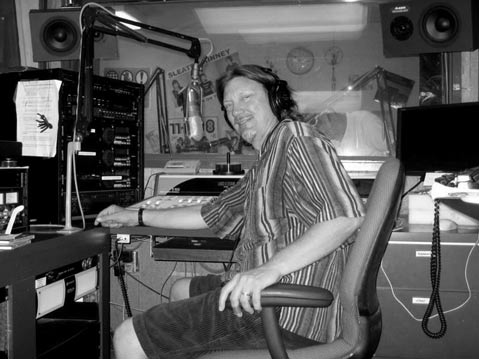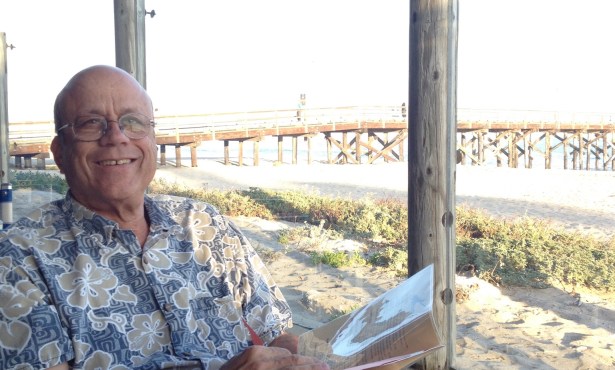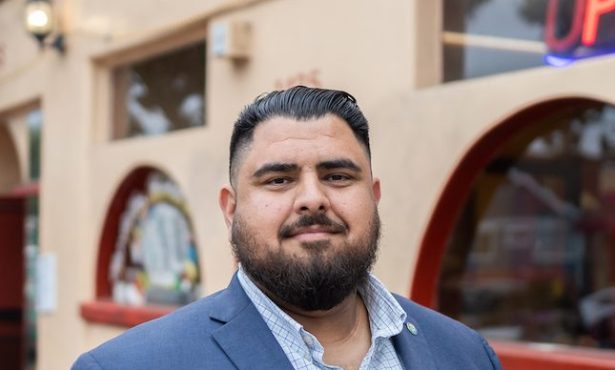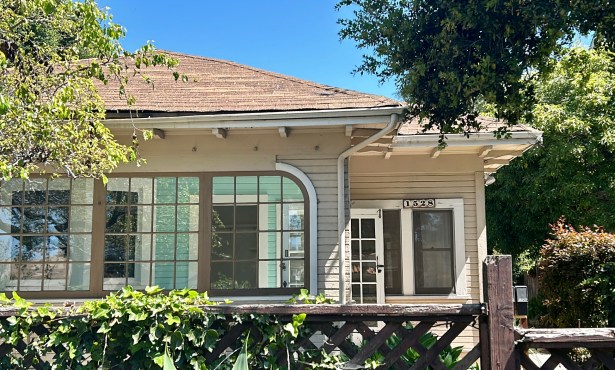Profiles in KCSBage: The Rick Show
DJ Rick Fenz Is a Master of the Art of Eclecticism

For half a decade, Saturday mornings on the KCSB schedule have promised that you will “travel down a different musical road every week, with various genres played in unlikely combinations.” True, dozens of KCSB programs—perhaps even scores of them—wander all over the musical map, dropping unlikely combinations as they stroll. But “Captain” Rick Fenz, author of that encapsulation and pilot of the show it describes, is a man who takes his eclecticism more seriously than most.
A machine-shop owner and operator during the week, Fenz devotes two hours of every weekend to the airwaves, and usually a few more in preparation time, sharing his knowledge of and enthusiasm for music of all stripes. Somewhat shy and un-exhibitionistic by nature—“I hate being the center of attention,” he didn’t hesitate to tell me—he was initially urged on to create The Rick Show by the late longtime KCSB DJ Bill Savoy. Better known as “Billy Clarke” to fans of his own variety-packed program Music Soup, Savoy worked for years as Fenz’s shop foreman, making stronger and stronger overtures to draw his colleague into the KCSB fold.
“He kept bugging me to do a show on KCSB,” Fenz recalled. “He’d say, ‘Rick, you’re more of a music wonk than I am!'” One day, Savoy simply opened the gateway by handing Fenz the fruit of his latest vinyl-hunting trip: a crate of classic rock albums. “Bill didn’t know the music, but he knew I did,” Fenz said, “so he asked me to go through the box and make a playlist that we could play together on the radio. When I joined him in the studio, I was so nervous, so choked up that I could barely talk into the microphone. But two hours later, I felt like I was on my living room couch, telling stories and talking music. Bill had a way of making people comfortable like that.”
A Santa Barbara resident since the late 1970s, Fenz had already grown familiar with KCSB’s sensibility. Over the years, he’d tuned in regularly to John Bisom’s jazz show Birdland, storyteller Michael Katz’s Katz Pajamas and Pat Cardenas’s world and folk program The Black Nag, which today immediately follows The Rick Show. Coached by Savoy, Fenz made a quick rise from KCSB’s AM training station, KJUC, to a 2 a.m. graveyard Sunday shift, to his current Saturday morning home. He frequently joined forces with friends and fellow DJs Savoy, Wayne Wilcox. and Phil Colaprete, forming the “Four Musketeers,” as they’d come to call themselves. They produced countless hours of memorable radio together.
Many DJs choose to create genre-based programs because of a singular musical passion that overwhelms all others—or, less romantically, because they only like one kind of music. Not so for Fenz, whose youth in central New Jersey placed him within signal range of not only Manhattan’s numerous cutting-edge radio stations, but also of a cluster of experimental college broadcasters. Many of these formative years happened to occur in the 1960s, which Fenz described as “a time when mainstream pop and rock had a wide range of influences, incorporating jazz, blues, and R&B, integrating all of that before the commercial aspects of the industry started to pigeonhole everything.”
The unpredictable sets spun by WNEW’s now-legendary Jonathan Schwartz opened the young Fenz’s ears to the possibilities of radio as a medium of expression. “I heard him play one set that included both Frank Sinatra and Johnny Winter. And he made it work! I couldn’t believe how great it was listening to those two side-by-side.” Later, the advent of consumer random-access digital media like the compact disc helped him hone his playlist-crafting abilities at home. “I loved it when those six-disc players came out,” he said. “I’d drop a few albums in, set it to random and just listen to what came out. But it was sometimes a little disconcerting! It’s not always easy to make things flow.”
Growing up appreciating classic freeform DJs, and conducting these listening experiments in private, instilled in Fenz a respect for the art of eclecticism. While plenty of hopefuls approach KCSB with a desire to play music free of genre constraints, few understand the extent of the discipline and effort required to assemble and execute a credible freeform set. Though Fenz traditionally puts together themed shows for Halloween, “Christmas in July,” Fiesta, the anniversary of Woodstock, and Grateful Dead guitarist Jerry Garcia’s birthday—“August gets crowded,” he noted—he finds a much greater challenge in making a unified musical experience out of a bunch of seemingly incompatible styles.
That’s easy to believe, given the far-reaching artist rosters his sessions feature: One recent show included no less than Aerosmith, 4 Non Blondes, Little Richard, Diana Krall, and The Flying Burrito Brothers. I sat in on his retrospective of the 2000s, during which he showcased his favorites of the decade: Radiohead’s 2000Kid A, Beyoncé’s 2003 Crazy in Love, Osvaldo Golijov’s 2006’s Ainadamar, and The Doughboys’ 2007 Is It Now?, to name but four. As long as he digs their stuff, Fenz refuses to shy away from spinning musicians commonly thought of as commercial. “I do sometimes listen to commercial radio to figure out what not to play,” he admitted, “but I won’t play something just because it isn’t commercial.” Hence his split-the-difference tendency, when playing big-name artists, to avoid the chart-climbing singles and focus on the lesser-heard “deep tracks,” which, in the judgment of the commercial radio industry, might as well have been recorded by an obscure garage band in Terre Haute as Bruce Springsteen.
This can all be a bit of a high-wire walk, especially for a self-described introvert who has stories about his own inability to even speak at weddings. Yet on the mic as well as on his combined music-playing setup of CD players, iPod, and the internet, Rick Fenz seems as confident as can be. Perhaps this owes something to another way his life has inadvertently prepared him for this avocation: His oldest daughter danced ballet professionally for the better part of a decade, and with his construction background, Fenz was often enlisted to provide backstage assistance at her performances. “I always thought that was the most interesting place to watch the show from,” he said. “I saw all the excitement and drama. I saw the dancers worry about how they’d done on stage. It made me realize something: the less you do to point out your mistakes, the less the audience notices them .”
4•1•1
The Rick Show airs Saturdays, from 7:30-10:30 a.m., on KCSB, FM 91.9.



